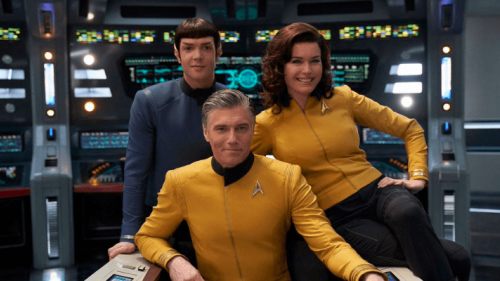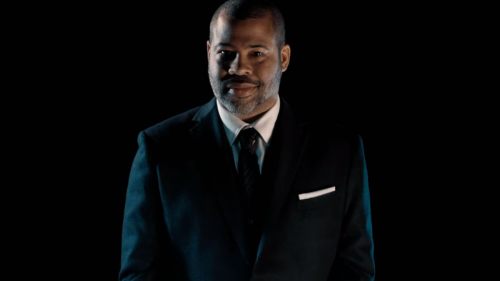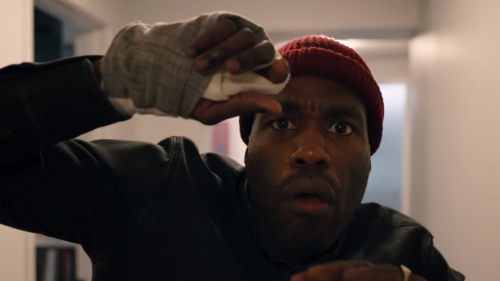The New TWILIGHT ZONE Has A Swearing Problem
I remember being aware of Rod Serling's The Twilight Zone long before I actually saw episodes of The Twilight Zone. The series' place in pop culture history is iconic enough that my parents - neither of whom you might call closely-observed students of pop culture - would react to weird situations by name-dropping the show's title, or imitating its singular theme song whenever something strange occurred. Eventually I asked for an explanation, and their description of the series set my brain on fire. I was a morbid kid, hoovering up whatever spooky entertainment my parents deemed appropriate, and this sounded right up my alley. Hell, even the name was cool: The Twilight Zone.
It wasn't long before my parents and I were watching episodes together, and y'know what? It was a perfect fit. For a 10-year-old, The Twilight Zone offered just the right amount of spookiness. Its black-and-white presentation was part of that (even now, there's something pleasingly creepy to me about the format), but its frequently nightmarish curveballs were the bigger draw. Sure, the show was also feeding me my vegetables by providing valuable life lessons and progressive attitudes about all manner of social issues (a fact my folks were almost certainly aware of), but that aspect honestly didn't register with me at that age. In retrospect, there can be no doubt that this is one of the show's great strengths.
Earlier this week, I was given access to the first four episodes of CBS All Access' new Twilight Zone, this version shepherded onto screens by producers Simon Kinberg and Jordan Peele, and for the most part I thought it was just about perfect: each episode represents a different, classic Twilight Zone flavor (I'll hold off on saying what thematic ground the third and fourth episodes cover, but I'll say that the first two cover "Paranoid Conspiracy" and "Be Careful What You Wish For" quite nicely), each is well-directed and sharply written. I have some minor quibbles with the runtime on each of the episodes, but my one big gripe - the thing I'm still thinking about days after watching these episodes - is the introduction of profanity into the Twilight Zone universe.
The first time a New Zone character dropped an F-bomb, my eyebrows raised. By the fifth or sixth time it happened, I found myself rolling my eyes. Anyone who's ever met me knows I am a man possessed of an absolutely filthy mouth (swearing is fun and expressive, fuck you!), but I could not for the life of me understand what adding bad words to The Twilight Zone actually brought to the table. Was I overreacting? Was I, against all odds, suddenly going prudish in my approaching-middle-age? It took me a little while to wrap my head around why The Twilight Zone's swearing problem bothered me so much, but once I did it all seemed very obvious: new Twilight Zone is a show my parents probably wouldn't have let me watch.
Historically-speaking, The Twilight Zone has always been an all-ages affair, a thing that could be enjoyed by the entire family. Its wisdom might read as thuddingly obvious to the adults in the room, but - just as I found out all those years ago - it could also be absorbed unknowingly by younger family members. Its scares were never too scary. Its language was never too coarse. Its violence was never graphic. Of course we could write this off as being the result of TV standards-and-practices in the late '50s/early '60s, but nothing about Serling or the writers he worked with over the years (among them Richard Matheson and Ray Bradbury) suggests that anyone was being held back from making a show that might be considered R-rated by today's standards. In fact, given The Twilight Zone's progressive streak, we can probably assume they wanted the show to reach as wide an audience as possible ... and that'd mean making it palatable to every age group.
I suppose there's an argument to be made that updating The Twilight Zone means dragging it into the modern day, where casual profanity does not carry the same stigma that it once did, and that - by extension - the added level of realism will only serve to make the show's fantasy elements land harder. To that, I would argue that a show which regularly incorporates extraterrestrials, inexplicable time warps, and heavy doses of nightmare logic probably shouldn't worry about making things that realistic; a standard, network TV level of mildly salty dialogue would surely accomplish the same thing. One might also say, as I did myself earlier in this piece, that swearing is fun and expressive and that, perhaps, I should fuck myself. A fair point, to be sure, but I'll take "honoring Twilight Zone history" over "Because it's fun to do" any day of the week. I might have a mouth like a dirty pirate hooker, but I also understand there's a time and a place.
I'm open to hearing the case for profanity in The Twilight Zone from the people behind the show (and if I'm non-plussed by its presence, I suspect many others will be, as well, which is likely to get someone involved to comment on its inclusion sooner rather than later), but I fear that the truth is this: The Twilight Zone is not a network series, but a streaming one, and as such it enjoys a certain number of freedoms, one of which is the ability to have its characters say "Fuck". It can be there, and it can be considered "edgy", and therefore it's been allowed to happen (see also: Star Trek: Discovery, also on CBS All Access). I really hope that's not the rationale here, but again - I'm struggling to understand why it needs to be there at all. As it stands, I think the addition of swearing to The Twilight Zone comes off feeling unpleasantly incongruous, an unnecessary addition that really doesn't add anything to an otherwise spectacular series. And, more importantly, it could mean that some families don't get to watch The Twilight Zone together.
What a shame that'd be.



